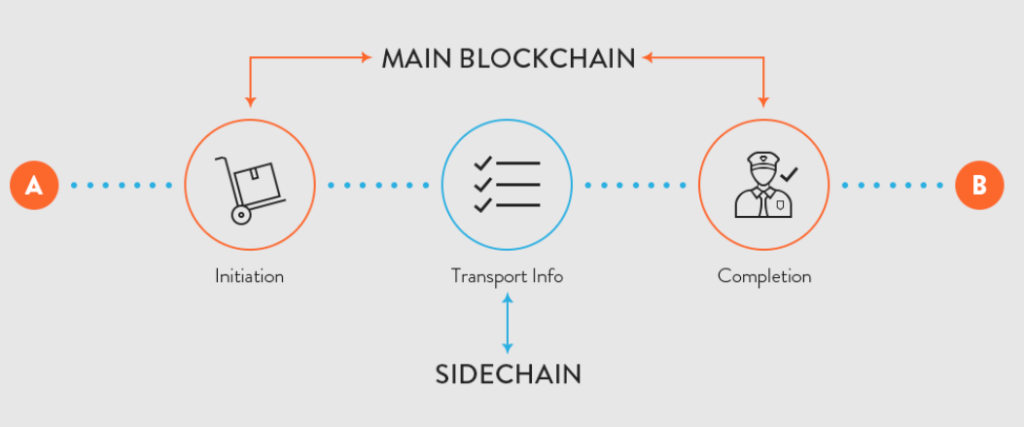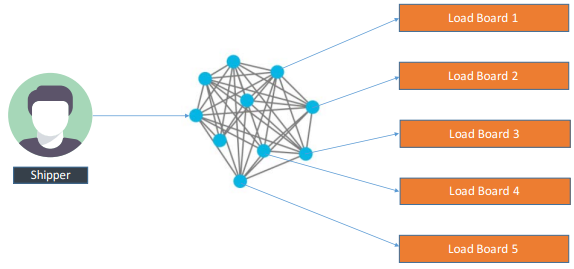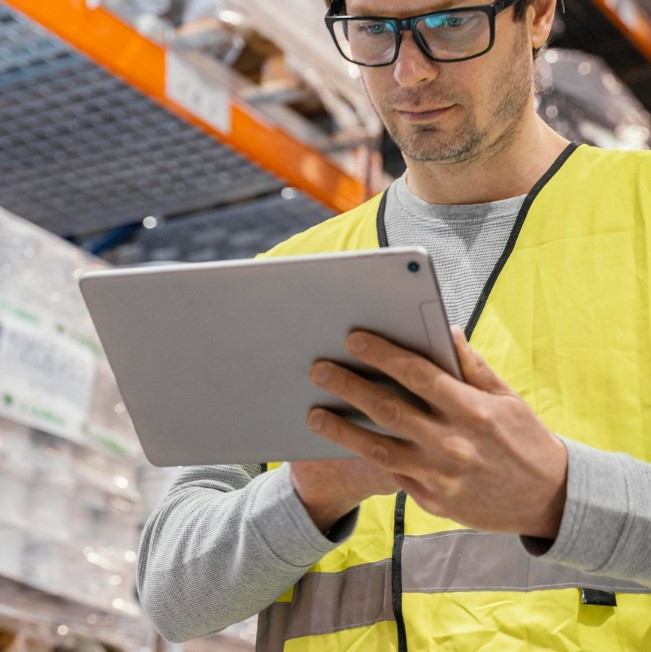How to Use Blockchain Technology in Logistics
The blockchain technology is used in various industries for data exchange, secure transactions and transparency. Logistics is one of the industries that can reap the benefits of the blockchain technology. Learn how you can use it in your logistics business.
What is blockchain?
A blockchain is a decentralized ecosystem of users that process and store each other’s data, and each block of data called a “block” is linked to another set of data with a chain. Each block is dependent on another block, so it’s impossible to reorder or change these blocks: their encryption depends on each part of the chain.
This makes blockchain an extremely transparent system, where you can’t change a single set of data without it affecting the entire chain. Data in blockchain stays there forever, that’s why this technology is so attractive to industries that require high security. Currently, fintech is the industry that uses blockchain the most, but other businesses also benefit from them massively. Logistics is one of such industries.
In this article, you’ll learn how the logistics industry can benefit from blockchain development services.
Blockchain in logistics
What is blockchain technology in logistics? A decentralized public record system that documents all changes to a record in real-time can help make logistics companies more efficient by publicly recording the movements of each shipping container. Armed with this data, companies can implement faster routes and eliminate unnecessary steps in the delivery process.
Distributed and decentralized ledgers also reduce the number of bottlenecks and clerical errors. Using smart contracts, retailers no longer need brokers, lawyers, or other third parties to complete tasks.
Smart contracts allow retailers and top logistics companies investing in blockchain to enter into binding agreements that are immediately terminated if all agreed conditions are not met. These ledger-based contracts increase transparency and profits while reducing delivery times and costly mistakes.
The logistics industry is poised for a technological upgrade, and distributed ledgers are the next big step towards record transparency, cost reductions, and efficient routing. When combined with new technologies such as big data and artificial intelligence, the blockchain could even increase global GDP by 5%.
How the blockchain helps logistics
Let’s look at blockchain solutions in logistics and how a supply chain can be improved by using blockchain.
Efficient delivery
Blockchain in logistics enables enhanced tracking and inventory visibility. It has the potential to improve the way goods are shipped and transported. In order to improve the delivery process and increase productivity, logistics companies can use blockchains to efficiently track goods.
To create an efficient logistics system, it’s essential to work globally and transparently to ensure and optimize the delivery of goods between parties as well as to ensure the security of information and financial transactions. However, due to the competitive nature of the logistics industry as well as non-standardized processes, data warehousing, and different levels of technological development, the industry has low transparency and a fragmented structure.
By removing red tape, blockchains can increase the efficiency of global trade. A large number of participants and a huge number of documents can be replaced by an automated process, providing a structured approach to monitoring a product’s life cycle from origin to checkout and facilitating all ownership changes between manufacturers, retailers, and customers.
Improved security
Existing systems are centralized, which means an attacker can gain full control over them once they gain access and can change or erase any information stored in the system.
In blockchain networks, there is no central authority over the whole system. Compared to competing solutions, a blockchain increases the degree of security, since a third party cannot change information stored on the chain. What’s more, blockchain networks can use cryptographic security techniques to make it virtually impossible for a hacker to change data in the blockchain.
Enhances transparency
A blockchain enhances transparency and security. This allows companies to effectively track changes and record what changed, why, who made the change, and when. Because all objects in a blockchain have the same registry version, there are no transaction conflicts in the chain and the transaction process becomes more efficient compared to traditional transactions.
Once products have been shipped and digital smart contracts have been signed, this will be reflected in the public ledger. Data is stored along with information about who created it and when, and this information is extremely difficult to fake. Companies with access to the ledger can keep track of items and see who currently has them.
Improved tracking and inventory management
There are lots of opportunities for blockchain in logistics in combination with other technologies. A blockchain in logistics can be combined with IoT and mobile technologies to develop real-time delivery monitoring systems. Tracking no longer has to be done manually. Instead, it can be done with digital sensors that track products throughout the supply chain from start to finish. With the help of a blockchain in transportation and the Internet of Things, logistics companies can reduce delivery times, ensure transparency, and closely monitor delivered goods.
Organizations can maintain accurate and up-to-date inventory using small sensors attached to products or objects. Such smart inventories can provide a wealth of useful data about items, their past whereabouts, how long they have been in place, and more. Thorough auditing of inventory can be simplified with IoT sensors, reducing the chances of product loss, mishandling, or other issues that can impact overall revenue.
Smart contracts
A smart contract is a program that helps regulate transactions between parties with digital currencies and assets. Similar to a traditional contract, a smart contract is a set of rules that define what must happen under specific circumstances.
However, a smart contract is created in such a way that the execution of the contract occurs automatically when all conditions are met. If something goes wrong, the contract is terminated and no exchange of assets takes place. This algorithm protects the property of all parties involved, ensuring no losses are incurred.
Smart contracts are based on blockchain technology, so the piece of code describing a smart contract is completely transparent to all blockchain participants. Many smart contracts are based on the Ethereum blockchain. An Ethereum smart contract is created using the Solidity language, which is similar in syntax to JavaScript.
Smart contracts are transparent to all members of the blockchain, and they are simply a piece of code that’s visible to everyone. This adds to the transparency of blockchain and allows you to make sure the exchange of goods happens according to the predetermined rules.
In addition, there is another important advantage of smart contracts: using a smart contract does not require recourse to a third party to ensure that all parties fulfill their contractual obligations.
But contracts aren’t always that simple. They can be complex and involve transactions in a variety of areas, such as insurance (Fizzy AXA) or crowdfunding (WeiFund). They have great potential to replace some of the functions that are currently performed by lawyers or notaries. As such, various industries will eventually have to adjust to keep up with the technological developments.
Performance history monitoring
Because everything is stored in blockchain without the possibility to change any data, it’s very easy to track the historical data and see how well your logistics chain performed across different time periods. Blockchain allows you to track the history of vehicles and look at how well your carriers performed.
This will allow you to make data-driven decisions on how to improve your supply chain and what carriers to partner with.
Efficient invoicing and payments
Developing efficient and secure billing and payment systems is a challenge in logistics. The blockchain has already demonstrated its ability to efficiently process transactions with the emergence of cryptocurrencies such as Bitcoin and Ethereum.
Tallysticks has developed a blockchain-based platform that can handle invoices and payments for logistics and other businesses. Based on smart contracts, it automatically authorizes the payment corresponding to the account. Visa has also embraced the blockchain and launched a B2B Connect payment service.
B2B Connect aims to facilitate payments across international borders while maintaining security and transparency. It also ensures that the fraud prevention and error-minimizing system works without the need for intermediaries.
Authenticity verification
The blockchain in logistics not only benefits businesses. It also benefits end users. Everledger has created a blockchain for the diamond industry that confirms the origin of a diamond. It solves a problem for consumers as well as those involved in the diamond business by using a blockchain and cryptography to track each diamond.
With more than a million diamonds digitized, Everledger has improved the detection of fraudulent claims, gaining trust and credibility in the industry. It also prevents forgeries. With Everledger, every owner of a sparkling stone can know its origin. And Everledger has no plans to stop at diamonds. They already work with other high-value products, including fine wines.
Fair freight marketplaces
Transparency is one of the biggest benefits of blockchain in logistics. The blockchain can be used to create a fair marketplace for companies looking to hire cargo carriers. Transparency in logistics is extremely important, as more than two dozen transportation companies are involved in transporting a single cargo around the world, which leads to a huge number of transactions. The blockchain can help keep each party responsible.
ShipChain is working on improving logistics with the help of a blockchain. The company is a member of the Blockchain in Transportation Alliance — an organization that UPS recently joined (UPS aims to develop blockchain platforms for freight transport). The ShipChain system uses a transparent blockchain contract platform that can be easily integrated with systems currently in use.

The purpose of ShipChain is to unify the tracking of various shippers and carriers to prevent theft. This will create a decentralized marketplace where parties select a delivery slot based on availability, estimated costs, and the time required for delivery.
Since prices vary based on supply and demand, companies, especially small ones, will get a fair deal.
Dispute resolution
One of the biggest challenges in freight transport is resolving disputes over delayed or non-compliant cargo. Disputes arise, and in such cases, companies traditionally employ independent auditors.
FedEx, another Blockchain in Transportation Alliance member, has come up with an additional initiative to use the blockchain to resolve customer disputes. The company plans to use a blockchain-based registry to store its records securely.
FedEx will share information before and after delivery to both the sender and recipient to facilitate dispute resolution. This will eliminate the need to involve a third party in the solution, preventing fraud.
Administrative сosts
Processing and administrative costs have risen to as high as 20 percent of overall transportation costs due to over-reliance on paper transactions.
According to the results of the experiment by IBM and Maersk, a single shipment can be carried by up to 30 different companies and news over 200 different communication lines. This experiment demonstrates that the modern process of delivery is far from being efficient, and communication at each stage of delivery is expensive and time-consuming.
Transportation of temperature-controlled goods
Food and medicine are two categories of shipments that require strict temperature control, and each day of delay can result in thousands of dollars of loss. Blockchain helps to optimize the shipment process, especially when going through customs.
Reliable load boards
Many transport companies are wary of uploading spreadsheets because data can often be confused or duplicated, giving an unreliable picture of demand. With a blockchain, shippers can place time-stamped shipments that are recorded and verified by a decentralized network. Because of this, a specific piece of data cannot be duplicated, and the data will retain its integrity.
A blockchain also removes the need for a broker, since the blockchain can authenticate the uploaded data, prevent duplication, and make it visible to the board. Here are some graphics that explain the process with and without blockchain technology.
Without blockchain technology:
Notice how easy it is for multiple brokers to place cargo on multiple loading bays, increasing the chance of duplication and uneven demand.
With blockchain technology:

With a blockchain, the information is timestamped and stored on a decentralized network accessible to various boards.
Final thoughts
The logistics industry is massive and complex. It can be extremely difficult to control the distribution of goods at various levels, as the supply chain can go through many stages and geographic points. To make matters worse, this industry includes many documents and invoices, and if even one sheet of paper goes missing, the delivery of goods can be delayed.
If you’re looking for a vendor who’ll be able to help you improve your existing supply chain and internal operations, you’ve come to the right place. At Mobindustry we have experience in building enterprise-sized solutions for logistics and can pair your existing system with technologies like blockchain, IoT, Big data, AI, and others.



